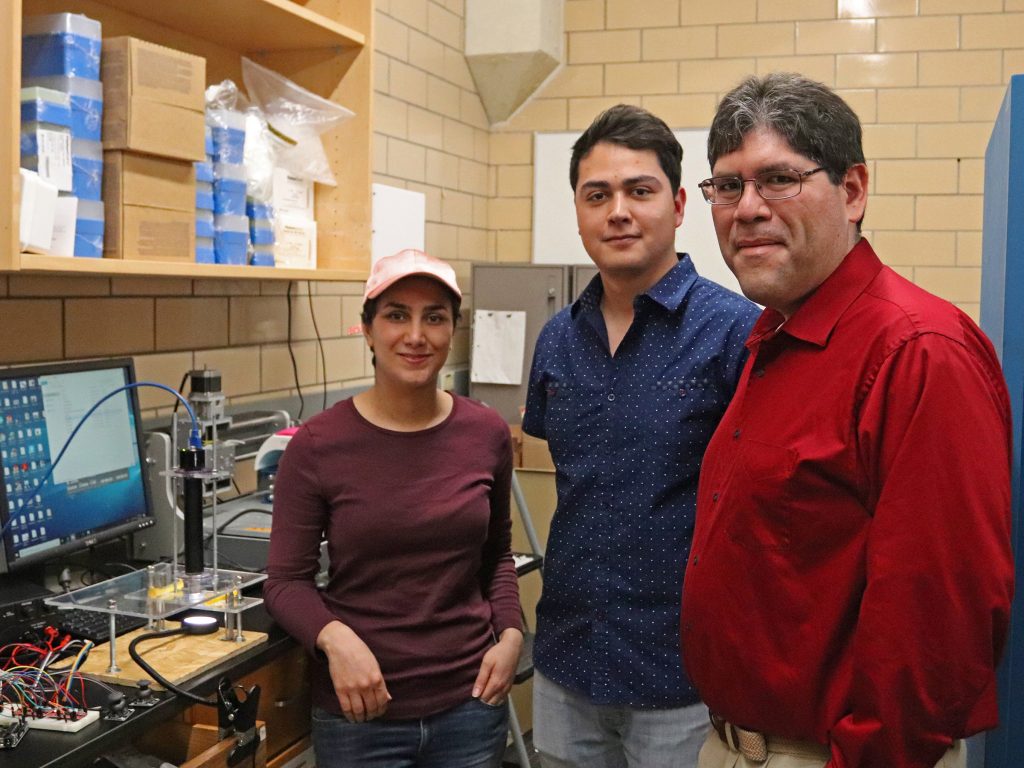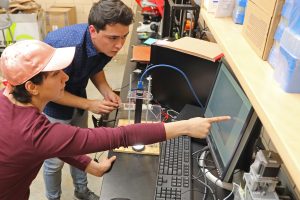Mentoring duo creates first-of-its-kind portable viscosity instrument

Jaime Juarez, assistant professor of mechanical engineering and a McNair mentor, had read a multitude of articles about portable optical microscopes that obtain real-time measurements out in the field instead of in a lab. But among these many articles, he did not find any portable means of performing rheology measurements, or how fluids flow under pressure.
Naturally, Juarez decided to look into the possibility himself.
With the help of Antonio Alvarez-Valdivia, junior in mechanical engineering and McNair Scholar, and Soheila Shabaniverki, graduate assistant in mechanical engineering, Juarez has been testing a portable system for measuring rheological properties such as fluid viscosity and elastic modulus. The system is based on a technique known as microrheology, where small micro- or nanoparticles are used as probes for measuring these properties. The technique works by measuring the diffusion rate of the probes and inferring the viscosity and elastic modulus of the sample from the data.
“Until now, microrheology has only been demonstrated using research-grade microscopes,” Juarez said. “My students built a portable optical microscope to find out if the microrheology could still produce results comparable to those observed in the research grade microscope.”
So far, the experiment has been successful. The team performed comparative experiments on both a research-grade microscope and the portable optical microscope to find that the results agree to within a 4-6% range.
Portable, in a variety of fields
During the summer of 2018, Alvarez-Valdivia helped create the portable optical microscope using scraps and spare parts. Unlike viscometers and rheometers that can only be used in a lab, this device is able to travel to location and measure the viscosity of a sample on site. The system works by taking a fluid sample and dispersing microparticles within. The microparticles are tracked with a video camera and their diffusion rates analyzed using codes written by Juarez to determine the sample viscosity.
 The practical applications of a portable instrument like the one Juarez’s team has developed are extensive, such as in the food industry. Soon, instruments like the one Juarez has developed could be used to monitor material properties to ensure uniform food production. Properties like viscosity and elastic modulus determine how stiff or pliable a food product might be. As a consequence, these properties can determine food texture or quality.
The practical applications of a portable instrument like the one Juarez’s team has developed are extensive, such as in the food industry. Soon, instruments like the one Juarez has developed could be used to monitor material properties to ensure uniform food production. Properties like viscosity and elastic modulus determine how stiff or pliable a food product might be. As a consequence, these properties can determine food texture or quality.
The platform could also be used in the chemical process or energy industry by monitoring the properties of particulate suspensions known as nanofluids, which enhance heat transfer properties from industrial processes to optimize their energy usage and reduce overall cost. This platform could also measure the viscosity of blood samples, which could be used by medical scientists and clinicians connect these properties to medical disorders that require blood thinners.
Valuable hands-on research experience
Alvarez-Valdivia started working with Juarez over the summer as part of the Multiscale Sensing Actuation and Imaging (MoSAIc) research experience for undergraduates, and they continued working on their research together during the academic year as a McNair Scholar and Mentor duo.
Iowa State’s Center for Multiphase Flow Research and Education (CoMFRE) provides resources to educate undergraduate students and connect with programs like the McNair Scholars to provide meaningful research experience to undergrads.
Alvarez-Valdivia said that research allows him to work on something he is interested in outside of the classroom, and he can even earn credits for an independent study in the area of his research. Alvarez-Valdivia feels proud of the instrument he has helped build, and it makes him confident in his own abilities.
“People don’t really know how research impacts their lives,” Alvarez-Valdivia said. “Sometimes it’s underestimated. Little things you see in research presentations are not so meaningful for you at the moment, but they really have an impact on how technology develops.”
An article based on Alvarez-Valdivia’s work has been accepted for upcoming publication in a journal called Experimental Thermal and Fluid Science.
